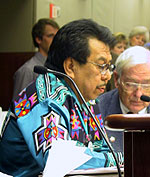House deals blow to gambling proponents
By Tom Scheck
Minnesota Public Radio
February 22, 2002
A key House policy committee defeated seven bills that would have expanded gambling in the state. Supporters argue that a state-run casino and other forms of gambling would provide an economic benefit to a state facing budget problems. They also argue the revenues could help finance a new stadium for the Twins and Vikings. Opponents say there's already enough gambling in the state and say it's morally wrong.
| |
|
|
|
||
The House Governmental Operations Committee soundly defeated all of the bills in a hearing that lasted most of the day. The packed hearing room was filled with both supporters and opponents. Some of the bills called for the state to license a metro-area casino to help the build a professional sports stadium. Other measures would've allowed for 1,700 slot machines at Canterbury Park race track in Shakopee.
An unusual mix of social conservatives, religious groups and Native American tribes testified against any form of gambling.
Oakdale resident Arlene Reed told the committee she was a compulsive gambler. She said gambling wrecked her life and doesn't want it to happen to anyone else.
"The lure of the casinos and the big win were a constant in my life," she said. "Many days I would show up to work with little or no sleep at all. I would call in sick and by 2000 my gambling addiction had exploded and I was spending between $200 and $1,000 per gambling episode."
Representatives of the Minnesota Indian Gaming Association told lawmakers that a state-run casino would harm the state's 19 tribal casinos. They said the main threat would be to Mystic Lake Casino in Prior Lake and Treasure Island Resort and Casino in Red Wing.
However, officials with two northern tribes say they aren't making enough money from their casinos and are pushing to jointly operate a casino with the state. The two Chippewa tribes say they have the two largest Native American populations in the state but don't have enough revenue for its members.
| |
|
|
|
||
Red Lake Tribal Chairman Bobby Whitefeather says a public/private casino would help his tribe. "Our community water sewer systems are crumbling. There's an ever increasing need for the usual government services that a government provides to its people and the need is increasing," he said.
Whitefeather says he'll continue to push the proposal in the Senate, even though the bill didn't receive a hearing there before a committee deadline.
Lawmakers who offered other proposals said Minnesotans are already gambling and argue the taxes and fees collected on a casino would help with the state's budget problems.
Those arguments angered Rep. Eric Lippman, R-Lake Elmo, who thinks gambling is morally wrong. He offered what he called his "smack down the deficit" amendment, which would allow the state to engage in other sorts of morally questionable activities.
"The argument has been that there's really no worse human tragedy than a budget shortfall, so I repeal the prohibitions that are in state law and provide the director of the lottery the ability to ask the federal government if we can sell heroin and other opiate addictive products at the casinos," Lippman said.
Lippman withdrew his amendment before a vote was taken.
Rep. Mike Osskopp, R-Lake City, said the committee didn't think it was necessary to move gambling-related legislation this year. He expects gambling related legislation to dwindle in future years as the state recovers from its economic downturn and a stadium solution is found.
"I think the Twins stadium issue drove the casino issue today. Should that be taken care of, I think this idea will ebb. I think the drive to build state-run gaming facilities will go away once the stadium issue is taken care of," Osskopp said.
Even though none of the gambling related bills was approved in the House and hasn't been heard in the Senate, lawmakers could still revive the plans until the session ends.
More from MPR

